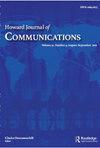佩洛西:《指向与权力:媒体话语中的支配、情感和性别的假设》
IF 0.8
Q3 COMMUNICATION
引用次数: 0
摘要
摘要:本研究调查了网上59篇关于南希·佩洛西(Nancy Pelosi)站在白宫内阁房间里指着唐纳德·特朗普(Donald Trump)的照片的文章。特朗普发布了这张照片,并在推特上发表了自己的解读;随后,网上的文章讨论了对这张照片和周边事件的描述和/或解释。本文关注当下的媒体话语如何反映出对政治中权力表达的看法,它与情感和情绪性的联系,以及它有时与性别的微妙联系。对文章的分析表明,媒体将照片中的非语言线索解释为个人权力展示的反映,通过支配性和顺从性非语言线索制定的相对权力,以及通过一个人的非语言线索降低另一个人的表观权力地位来改变相对权力。这也反映了一种现有的文化信念,即情感和权力在政治中通常是不一致的,但愤怒的表现除外,以及女性在政治中表现情感的特殊挑战。在这样做的过程中,媒体报道继续以不太明显的方式将政治领域男性化。本文章由计算机程序翻译,如有差异,请以英文原文为准。
Pelosi, Pointing, and Power: Assumptions about Dominance, Emotionality, and Gender within Media Discourse
Abstract This study examines 59 online articles written about a photograph of Nancy Pelosi standing up in the White House cabinet room and pointing her finger toward Donald Trump. Trump released the photo and tweeted his own interpretation of it; online articles followed discussing descriptions and/or interpretations of the image and the surrounding events. This paper focuses on how the media discourse of this moment reflects views about the expression of power in politics, its tie to emotion and emotionality, and its sometimes subtle connection with gender. Analysis of the articles showed that the media interpreted the nonverbal cues in the photograph as reflective of individual power displays, relative power as enacted through dominance and submissiveness nonverbal cues, and changing relative power through one person’s nonverbal cues lowering another’s apparent power position. It also reflected an existing cultural belief that emotionality and power are generally inconsistent in politics, with some exemptions for anger displays, and the particular challenges of emotional display for women in politics. In doing so, the media coverage continued its masculinization of the political sphere in less visible ways.
求助全文
通过发布文献求助,成功后即可免费获取论文全文。
去求助
来源期刊

Howard Journal of Communications
COMMUNICATION-
CiteScore
2.70
自引率
10.00%
发文量
23
期刊介绍:
Culture, ethnicity, and gender influence multicultural organizations, mass media portrayals, interpersonal interaction, development campaigns, and rhetoric. Dealing with these issues, The Howard Journal of Communications, is a quarterly that examines ethnicity, gender, and culture as domestic and international communication concerns. No other scholarly journal focuses exclusively on cultural issues in communication research. Moreover, few communication journals employ such a wide variety of methodologies. Since issues of multiculturalism, multiethnicity and gender often call forth messages from persons who otherwise would be silenced, traditional methods of inquiry are supplemented by post-positivist inquiry to give voice to those who otherwise might not be heard.
 求助内容:
求助内容: 应助结果提醒方式:
应助结果提醒方式:


